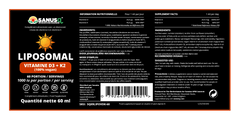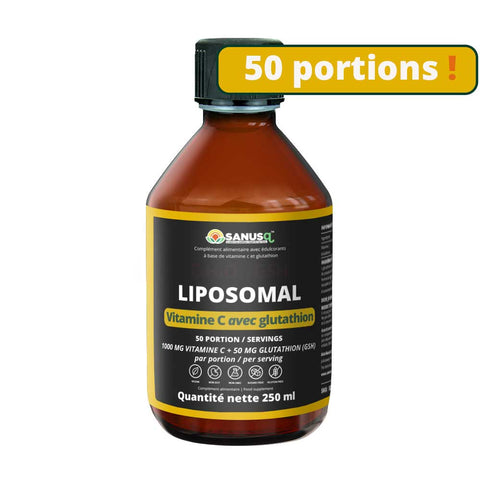SANUSq Health: Liposomal Vitamin D3+K2 (MK7) - 60ml
A powerful combination of Vitamin D3+K2 for healthy bones and cardiovascular system - an effective way to get the optimum daily dose of vitamins D3 and K2 for bone, heart and overall health.
📅 Best before: 31 May 2027
🌍 Origin: The Netherlands
✅ Registered with DGAL (France): #2023-3-262
- French government certified for safety and compliance [View PDF Certificate]
🔖 SKU: SQ09LIPOVDK-60
📊 Barcode: 0792649289921
(Check our current promotions before buying)
Main ingredients: (per 1ml serve): 25 mcg / 1,000 IU Vitamin D3 (from cholecalciferol vegan D3); 45 mcg (1,000 IU) Vitamin K2 (from all-trans MK7 K2). Refer to label for full list of ingredients.
Suggested daily dosage: Take 1ml per day, with meals. Shake the bottle well before each use. Do not use if seal is broken or missing. Discount bundle available (Click here)
Storage: Refrigerate after opening and use within 60 days.
------------------------------
Product Description
- DGAL registered (France) #2023-3-262 [View PDF Certificate]
- Official French government certification ensuring compliance with EU supplement safety standards.
- 1,000 iu Vitamin D3 and 45mcg Vitamin K2 per 1ml serving
- Liposomal vitamin D3/K2 for improved bioavailability and absorption
- Vegan, Non-soy, Non-GMO, Sugar free, Gluten free
- Glass bottle with dropper for precision dispensing
- Achieves efficient use of calcium
- Maintains optimum bone health
- Prevents calcification in arteries, lowers risk of heart disease
- Strengthens immunity
- Lowers inflammation
- Delivered through liposomes for enhanced bioavailability
Vitamin D3: More than just bone health
Vitamin D helps in the absorption of calcium and phosphorus – playing an important role in keeping bones and muscles healthy. However, functions of the sunshine vitamin are not restricted to calcium absorption and bone formation. Research shows that vitamin D:
- Affects EVERY cell in the body
- Helps in proper functioning of almost all the tissues and organs including the brain, skeletal system, heart, muscles, endocrine glands, and immune system
- Keep bones strong and healthy
- Boosts natural immunity
- Reduces the risk of autoimmunity
- Promotes healthy pregnancy
- Regulates hormones
- Maintains healthy blood sugar levels
- Improves heart health
- Improves learning, memory and concentration
- Improves mood, eases symptoms of depression and anxiety

Vitamin D for bones and muscles
Vitamin D helps absorb calcium and phosphorus. In addition, it works with the parathyroid hormone to regulate calcium levels in the body.
- Prevents osteoporosis
- Reduces risk of falls and fractures
- Supports healthy muscle functions
- Improves chronic pain and fatigue symptoms associated with fibromyalgia
Vitamin D for heart
Poor vitamin D levels increase cardiovascular risk factors such as high blood pressure, vascular stiffness, inflammation, higher calcium stores in coronary artery, insulin resistance and diabetes. [1-2] Your risk of heart disease increases significantly if you have a vitamin D deficiency. Vitamin D helps to:
- Regulate blood pressure
- Reduce inflammation, lower risk of atherosclerosis (plaque formation)
- Improve heart functions in people with heart failure
- Improves insulin sensitivity in cells
Vitamin D for immunity
Vitamin D supports healthy immune function [3]. The sunshine vitamin not only boosts natural immunity and helps fight infections; it also regulates adaptive immunity that controls autoimmune responses. Research shows that vitamin D deficiency increases the risk of autoimmune disorders such as hypothyroidism, type-1 diabetes mellitus (T1DM), Addison’s disease, and Graves’ disease. [4-5] Vitamin D helps to:
• Reduce the risk of developing respiratory tract infections [6-7]
• Reduce the risk of severe asthma attacks in people with poor vitamin D levels [8]
• Reduce the risk of autoimmune disorders
People with chronic vitamin D deficiency have an increased risk of:
- Osteoporosis (weak, brittle bones)
- Poor muscle functions
- Depression
- Dementia and cognitive decline
- Heart disease and high blood pressure
- Impaired immunity
- Common cold, flu and upper respiratory infections
- Asthma and wheezing disorders
- Macular degeneration, dry eye
- Autoimmune disease
- Chronic pain, arthritis and fibromyalgia
- Autism
- Cancer
- Diabetes
- Pregnancy complications (preterm labor, premature birth, preeclampsia)
While sun exposure is the best way to get most of the vitamin D you need, modern lifestyle – for example, with considerable time spent indoors and the use of sunscreen – makes it difficult to achieve optimum levels through sunlight alone. Some foods like fish, eggs and mushroom do contain vitamin D but it is not enough. A high-quality vitamin D3 supplement is the next best solution to reverse vitamin D deficiency and to maintain an optimum vitamin D status for stronger bones, stronger immunity and healthy emotional and mental well-being.
We need calcium for healthy bones. And we need vitamin D3 to absorb calcium from the intestines. But did you know you also need vitamin K2 to complete this equation and get the maximum benefits ? Let’s see what makes vitamin D3 and vitamin K2 the best duo when it comes to supporting your heart and skeletal health.
Benefits of Vitamin K2
Vitamin K2 is a powerful anti-oxidant and performs many functions in the body. One of its most important (and lesser-known) function is to prevent calcium accumulation in places where it can be a problem for your health, such as in the arteries or in the intestines.
Why do you need vitamins K2 with D3?
The partnership between vitamins D3 and K2 ensures that the body is able to utilize calcium efficiently. Vitamin D3 helps in calcium and phosphorus absorption. But it is vitamin K2 that controls where this calcium goes in the body. [9]
Vitamin K2 directs calcium into the bone matrix and away from other soft tissues and organs. This helps in bone mineralization and bone growth and stops calcium to accumulate in unwanted places like arteries, where it can contribute to plaque formation (atherosclerosis) and hardening of arteries. Calcification in arteries increases your risk of cardiovascular disease like heart attack, heart failure and stroke. Studies show that healthy K2 levels may help reduce the risk of osteoporosis and fractures in postmenopausal women [10]. It also reduces the risk of heart disease [11] and insulin resistance.
How Vitamin K2 contributes to bone and cardiovascular health?
- Vitamin K2 activates osteocalcin, a protein produced by osteoblasts (cells responsible for building bones). Osteocalcin binds calcium and carries it to the bone tissue.
- Vitamin K2 also activates matrix GLA protein (MGP), a protein that binds and removes calcium present in the blood vessels, thus preventing arterial calcification.
- Vitamin K2 also works as a powerful antioxidant.
Are you taking calcium and vitamin D for healthy bones? It is not enough if you are deficient in vitamin K2.
Why K2 supplementation may be necessary
Vitamin K2 is made by the bacteria in the gut and is mostly found in fermented foods like natto, sauerkraut and cheese especially Gouda and Brie. It is also present in organic, grass-fed animal products such as liver, egg yolk and butter. Unlike vitamin K1, that is found in green leafy vegetables, vitamin K2 is usually difficult to get from diet easily.
The Best Quality Liposomal Vitamin D3+K2
Our high-quality supplement is delivered through unique liposomal technology. Liposomes are small particles that help deliver vitamin D3 and vitamin K2 molecules directly to the cells and tissues – achieving improved absorption and bioavailability.
Precautions
Consult your doctor if you are pregnant or breastfeeding, and also to determine if the supplement is suitable for children.
References:
- Ioana Mozos, Otilia Marginean. Links between Vitamin D Deficiency and Cardiovascular Diseases. BioMed Research International. 2015
- Zhou et al. Non-linear Mendelian randomization analyses support a role for vitamin D deficiency in cardiovascular disease risk. European Heart Journal. 2022.
- Tomoka et al. The Effects of Vitamin D on Immune System and Inflammatory Diseases. Biomolecules. 2021
- Altieri et al. Does vitamin D play a role in autoimmune endocrine disorders? A proof of concept. Rev. Endocr. Metab. Disord. 2017
- Appuni et al. Association between vitamin D deficiency and hypothyroidism: results from the National Health and Nutrition Examination Survey (NHANES) 2007–2012. BMC Endocrine Disorders. 2021.
- Jolliffe et al. Vitamin D supplementation to prevent acute respiratory infections: a systematic review and meta-analysis of aggregate data from randomised controlled trials. The Lancet. Diabetes and Endocrinology. 2021.
- Martineau et al. Vitamin D supplementation to prevent acute respiratory tract infections: systematic review and meta-analysis of individual participant data. BMJ, 2017
- Martineau et al. Vitamin D for the management of asthma. Cochrane Database of Systematic Reviews. 2016.
- Katarzyna Maresz. Proper Calcium Use: Vitamin K2 as a Promoter of Bone and Cardiovascular Health. Integr Med (Encinitas). 2015
- Huang et al. Does vitamin K2 play a role in the prevention and treatment of osteoporosis for postmenopausal women: a meta-analysis of randomized controlled trials. Osteoporos Int. 2015
- Hariri et al. Vitamin K2—a neglected player in cardiovascular health: a narrative review. Open Heart 2021.
- Veugelers, P.J. and Ekwaru, J.P. A statistical error in the estimation of the recommended dietary allowance for vitamin D. Nutrients. 2014.
- Dr John Campbell. Vitamin D mistake. Youtube 2025.

Disclaimer
Information on our websites, in our blogs and our emails are provided for informational purposes only, and have not been evaluated by the EMA, EFSA or FDA. It is not meant to substitute medical advice provided by your healthcare professional and is not intended to diagnose, treat, cure, or prevent any disease. Our products are intended for adults, 18 years of age and older. While Vitamin D3+K2 has been shown to have various health benefits, it is important to remember that supplements and dietary changes should be considered as part of an overall health plan and not as a substitute for professional medical treatment. Only a qualified healthcare practitioner can provide personalized advice and treatment plans based on your individual health needs and medical history, and you should seek advice from your healthcare professional before taking product(s) if you are pregnant or nursing.












 Pin it
Pin it


